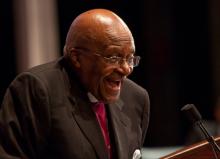Anglican Archbishop Desmond Tutu

IN HIS BOOK God’s Politics, Jim Wallis tells the story of his trip to South Africa during the apartheid era. During his trip, Wallis attended an ecumenical service at St. George’s Cathedral in Cape Town. While Archbishop Desmond Tutu was preaching, South African police entered the church — carrying recording devices to monitor for any anti-government sentiment — to intimidate the congregation and the anti-apartheid activists. Undeterred, Tutu reportedly continued to preach joyfully, becoming even more passionate in his truth-telling against apartheid. Moments later, the crowd spontaneously erupted in dancing and celebration.
Joy, in the form of dance, may have seemed inappropriate for the moment, but it was really a coded form of resistance and revolution. Even if dancing is not our forte, there is something we can learn from the way the congregation used this subversive, embodied art form.

I FIRST HEARD Archbishop Desmond Tutu speak at the National Cathedral in Washington, D.C., sometime around 1987. It was at the height of apartheid in South Africa, and the world was just waking up to its horrors and organizing global economic sanctions.
Tutu spoke of an elderly woman he had met a few days earlier in Soweto. She told him that every night she got up at 2 a.m. for an hour in order to beg God solemnly for an end to apartheid. “I know we will win now,” Tutu told us, “because God cannot resist the prayer of that poor old woman.” With that, he burst into tears. Those tears of peace converted the thousands of us who crowded in to hear him. We had never heard such a witness for peace.
Later, I came to know him as a friend. During my 2014 pilgrimage to South Africa, I spent a morning visiting the great man at his foundation headquarters in Cape Town. First, we had Mass together with his staff; then he catered a brunch for me and my friends. He and I helped ourselves to a plate of food and coffee, then sat together by ourselves for an hour.
“We do not have the right to give up this work,” he told me. “Our sisters and brothers are suffering around the world, so we have to keep working for peace and justice till the day we die.” I was amazed to hear that he planned to leave the next day for Iran. He was in his 80s, in bad health, and relentless.
He spoke of the millions of squatters living in total poverty around Cape Town and elsewhere. “We have the ultimate First World wealth and the worst Third World poverty, the biggest gap between rich and poor in the world,” he said. “One percent of the money for war and nuclear weapons could feed and house these poor people. Sometimes I say to God, ‘What the heck is going on? Why don’t you do something?’”

Retired Anglican Archbishop Desmond Tutu, who won the Nobel Peace Prize for his fight against apartheid in South Africa, continues to speak around the globe on justice and peace. Butler University and neighboring Christian Theological Seminary in Indianapolis announced Thursday that they would name a center for the 81-year-old icon.
Just before the announcement of the new center, Tutu spoke with Religion News Service about faith and justice, Israel and Palestine and Pope Francis’ recent selfie and lifestyle choices. Some answers have been edited for length and clarity.